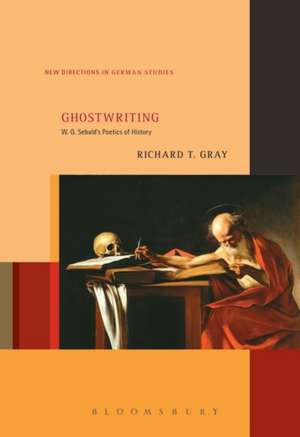Ghostwriting: W. G. Sebald’s Poetics of History: New Directions in German Studies
Autor Dr. Richard T. Grayen Limba Engleză Hardback – 15 noi 2017
| Toate formatele și edițiile | Preț | Express |
|---|---|---|
| Paperback (1) | 234.64 lei 6-8 săpt. | |
| Bloomsbury Publishing – 29 mai 2019 | 234.64 lei 6-8 săpt. | |
| Hardback (1) | 718.85 lei 6-8 săpt. | |
| Bloomsbury Publishing – 15 noi 2017 | 718.85 lei 6-8 săpt. |
Din seria New Directions in German Studies
- 14%
 Preț: 183.70 lei
Preț: 183.70 lei -
 Preț: 470.90 lei
Preț: 470.90 lei - 8%
 Preț: 145.46 lei
Preț: 145.46 lei - 11%
 Preț: 219.84 lei
Preț: 219.84 lei - 23%
 Preț: 190.50 lei
Preț: 190.50 lei -
 Preț: 169.03 lei
Preț: 169.03 lei -
 Preț: 217.09 lei
Preț: 217.09 lei - 7%
 Preț: 134.49 lei
Preț: 134.49 lei - 14%
 Preț: 183.24 lei
Preț: 183.24 lei -
 Preț: 217.62 lei
Preț: 217.62 lei - 21%
 Preț: 214.78 lei
Preț: 214.78 lei - 22%
 Preț: 237.93 lei
Preț: 237.93 lei - 22%
 Preț: 225.77 lei
Preț: 225.77 lei - 22%
 Preț: 256.77 lei
Preț: 256.77 lei - 22%
 Preț: 225.41 lei
Preț: 225.41 lei - 23%
 Preț: 222.46 lei
Preț: 222.46 lei - 30%
 Preț: 714.12 lei
Preț: 714.12 lei - 30%
 Preț: 568.22 lei
Preț: 568.22 lei - 21%
 Preț: 218.36 lei
Preț: 218.36 lei - 11%
 Preț: 218.47 lei
Preț: 218.47 lei - 13%
 Preț: 186.35 lei
Preț: 186.35 lei - 30%
 Preț: 569.94 lei
Preț: 569.94 lei - 21%
 Preț: 218.83 lei
Preț: 218.83 lei - 22%
 Preț: 256.20 lei
Preț: 256.20 lei - 14%
 Preț: 190.06 lei
Preț: 190.06 lei - 23%
 Preț: 197.14 lei
Preț: 197.14 lei - 13%
 Preț: 255.11 lei
Preț: 255.11 lei - 22%
 Preț: 226.79 lei
Preț: 226.79 lei - 30%
 Preț: 568.14 lei
Preț: 568.14 lei - 14%
 Preț: 191.85 lei
Preț: 191.85 lei -
 Preț: 183.24 lei
Preț: 183.24 lei -
 Preț: 231.81 lei
Preț: 231.81 lei - 22%
 Preț: 230.24 lei
Preț: 230.24 lei
Preț: 718.85 lei
Preț vechi: 1030.20 lei
-30% Nou
Puncte Express: 1078
Preț estimativ în valută:
137.55€ • 143.61$ • 113.84£
137.55€ • 143.61$ • 113.84£
Carte tipărită la comandă
Livrare economică 05-19 aprilie
Preluare comenzi: 021 569.72.76
Specificații
ISBN-13: 9781501329999
ISBN-10: 1501329995
Pagini: 464
Ilustrații: 36 b/w illustrations
Dimensiuni: 140 x 216 x 44 mm
Greutate: 0.72 kg
Editura: Bloomsbury Publishing
Colecția Bloomsbury Academic
Seria New Directions in German Studies
Locul publicării:New York, United States
ISBN-10: 1501329995
Pagini: 464
Ilustrații: 36 b/w illustrations
Dimensiuni: 140 x 216 x 44 mm
Greutate: 0.72 kg
Editura: Bloomsbury Publishing
Colecția Bloomsbury Academic
Seria New Directions in German Studies
Locul publicării:New York, United States
Caracteristici
A comprehensive approach to W. G. Sebald's prose fictions as a complex body of work and a deep examination of how Sebald's fictions emerge from his scholarly practices and mature over the course of his writing career
Notă biografică
Richard T. Gray is the Byron W. and Alice L. Lockwood Professor in the Humanities and Professor of German and European Studies at the University of Washington, USA. He is the author of five books, including Money Matters: Economics and the German Cultural Imagination, 1770-1850 (2008), A Franz Kafka Encyclopedia (with Ruth V. Gross, Rolf Goebel, and Clayton Koelb; 2005), About Face: German Physiognomic Thought from Lavater to Auschwitz (2004), and Stations of the Divided Subject: Contestation and Ideological Legitimation in German Bourgeois Literature, 1770-1912 (1995). He is the editor and/or translator of 11 books, including Volumes 2 and 11 of The Complete Works of Friedrich Nietzsche in 20 Volumes and Approaches to Teaching Kafka's Short Fiction (1995). He is Editor-at-large of Journal of the Kafka Society of America and General Editor of book series Literary Conjugations.
Cuprins
List of AbbreviationsList of IllustrationsAcknowledgmentsIntroduction: Sebald's Literary Séance1. Wittgenstein's Ghost: Toward Understanding Sebald's Literary Turn2. The Birth of the Prose Fictionalizer from the Spirit of Biographical Criticism: Schwindel. Gefühle3. Sebald's Literary Refinement: "Dr. Henry Selwyn" and Its Textual Predecessor4. Neither Here Nor There: Exile as Dis-Placement in "Dr. Henry Selwyn"5. Sebald's Ectopia: Homelessness and Alienated Heritage in "Max Aurach"/"Max Ferber"6. Fabulation and Metahistory: W. G. Sebald and the Problematic of Contemporary (German) Holocaust Fiction7. Sebald's Segues: Performing Narrative Contingency in Die Ringe des Saturn8. Writing at the Roche Limit: Order and Entropy in Die Ringe des Saturn9. Narrating Environmental Catastrophe: Ecopsychology and Ecological Apocalypse in Sebald's Corsica ProjectBibliographyIndex
Recenzii
A truly magisterial scholarly work on a writer who continues to inspire a small industry of academic labor. In his new 464-page book Gray has produced what may very well be the definitive text on Sebald for both languages and readerships.
Richard T. Gray is a remarkable reader of W. G. Sebald. Meticulous in his attention to detail as well as learned in understanding of the broader contexts, he teaches us new ways to think about this enigmatic writer.
Ghostwriting is well-written, informative, and wonderfully insightful. With a lucid and evocative style, Richard T. Gray presents exciting revelations about new archival materials: Sebald's marginalia from his library and his partially unpublished manuscript about pending ecological disaster in Corsica (and the world). This book poses the question that all Sebald readers have asked at some point: In what direction might Sebald's writing have gone if he had not died at age fifty-seven? Gray investigates whether Sebald might have returned to the eco-psychological style of the Corsica piece, as a ghostwriter for nature. Especially welcome is the wide-ranging learnedness, which Gray wears lightly, that makes Ghostwriting not just about Sebald but about modern Western literature and thought. This is an excellent, strong, authoritative book-the first to treat Sebald with the care that such a great writer deserves.
Richard T. Gray is a remarkable reader of W. G. Sebald. Meticulous in his attention to detail as well as learned in understanding of the broader contexts, he teaches us new ways to think about this enigmatic writer.
Ghostwriting is well-written, informative, and wonderfully insightful. With a lucid and evocative style, Richard T. Gray presents exciting revelations about new archival materials: Sebald's marginalia from his library and his partially unpublished manuscript about pending ecological disaster in Corsica (and the world). This book poses the question that all Sebald readers have asked at some point: In what direction might Sebald's writing have gone if he had not died at age fifty-seven? Gray investigates whether Sebald might have returned to the eco-psychological style of the Corsica piece, as a ghostwriter for nature. Especially welcome is the wide-ranging learnedness, which Gray wears lightly, that makes Ghostwriting not just about Sebald but about modern Western literature and thought. This is an excellent, strong, authoritative book-the first to treat Sebald with the care that such a great writer deserves.















